Iran Sends Undercover Intelligence Agents Abroad As Boxing Referees

An exclusive report by the IranWire website reveals that undercover judicial officials posed as referees for international boxing events to report back to the regime.

An exclusive report by the IranWire website reveals that undercover judicial officials posed as referees for international boxing events to report back to the regime.
Citing information from an intelligence source within the Ministry of Sports and Youth, IranWire disclosed that Abolfazl Ameri Shahrabi, the Deputy Prosecutor of Arak, and Majid Abbaszadeh, a member of the intelligence organization of the Joint Chiefs of Staff, were sent abroad to boxing event under the guise of international referees.
According to the report, Ameri Shahrabi's involvement in the world of boxing dates back to his participation in the national boxing team's camps between 1995 and 1998. He transitioned into refereeing the sport during the early 2010s. The report further revealed ongoing discussions about the potential transfer of Ameri Shahrabi to Tehran to assume a new position in one of Tehran's sensitive judicial centers.
Ameri Shahrabi is the same judicial official who filed charges against Sadrollah Fazeli Zarei and Yousef Mehrdad, who were executed in May 2023on accusations of blasphemy and insulting religious and Islamic sanctities on social media.
On a related note, Majid Abbaszadeh, a boxing referee and a member of the intelligence protection organization of the Joint Chiefs of Staff of the Armed Forces, assumed the position of the head of the Tehran Boxing Association in July of this year.
This disclosure of the overseas travels of these two individuals with judicial and intelligence affiliations to European and American countries comes at a time when Western nations have imposed sanctions on numerous officials of the Islamic Republic.

A Swedish citizen, part of the EU diplomatic corps, has been covertly detained in Iran for over 500 days as part of Iran's hostage diplomacy, reports The New York Times.
Johan Floderus, 33, who worked for the European Union's diplomatic corps, was arrested at Tehran airport in April 2022 as he prepared to depart the country after what was described as a private tourist trip with friends.
In July 2022, the Iranian government released a statement announcing that it had apprehended a Swedish national for espionage who was being held in Evin prison, however they did not disclose any further details.
The New York Times spoke to six individuals with first-hand knowledge of the case, who all confirmed that Floderus’ had nothing to do with any espionage claims.
The Swedish Ministry for Foreign Affairs said it would not comment on the details of the case, citing a need for secrecy. “A Swedish citizen — a man in his 30s — was detained in Iran in April 2022,” its press department said in a recent email. “The Ministry for Foreign Affairs and the Embassy of Sweden in Tehran are working on the case intensively.”
“We understand that there is interest in this matter, but in our assessment, it would complicate the handling of the case if the ministry were to publicly discuss its actions,” it added.
Floderus was detained when EU diplomats were hard at workto broker a nuclear deal between Iran and the United States. Two top EU foreign policy officials visited Tehran in mid-2022, while they kept his detention hidden from the public and European institutions. It is not clear to what extent the fact that one of their employees was held hostage impacted their mediating role.
Hannah Neuman, a German member of the European Parliament commented on the case on social media saying that parliament should have been informed about Floderus’ arrest, as well as attempts to secure his release and the impact on JCPOA negotiations.
She directly criticized the EU's policy of keeping Floderus’ arrest and detainment a secret as it may impact attempts to revive nuclear diplomacy. Others called for a policy re-think. “A serious recalibration of policy is needed,” said Kasra Aarabi, an academic, who took to social media to comment on the case. He further demanded the proscription of the IRGC and consolidated international action against the Iranian regime.
The European External Action Service, the diplomatic service for which Floderus works confirmed that they have been following the case very closely and that his arrest “underlines the very concerning tendency of Iranians to use EU nationals or Iranian dual nationals as pawns for political reasons." However, neither Swedish nor EU authorities have publicly discussed the situation, citing the need for confidentiality.
“This case has also to be seen in the context of the growing number of arbitrary detentions involving EU citizens,” added Nabila Massrali, a spokeswoman for the EU bloc’s diplomatic body. “We have used and will continue to use every opportunity to raise the issue with the Iranian authorities to obtain the release of all arbitrarily detained EU citizens.”
The arrest of Floderus follows a pattern of Iran detaining dual nationals and foreigners on dubious charges to use them as bargaining chips for prisoner exchanges or to extract concessions and funds.
A recent deal saw five American prisoners being released in return for freeing up $6bn of frozen Iranian funds in South Korea, which puts an approximate price of $1.2bn per head.
Relations between Iran and Sweden have soured recently, notably with the sentencing of a former senior Iranian judicial official, Hamid Nouri, to life in prison in Sweden for war crimes committed in Iran. Iran has escalated pressure on Sweden in response.
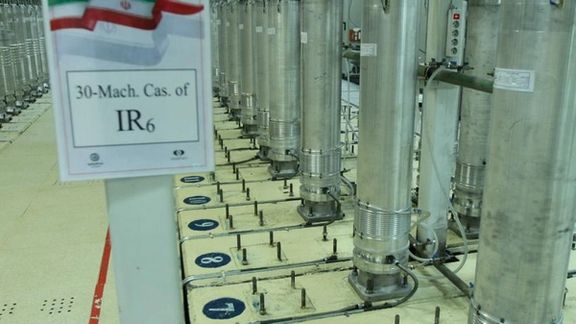
Iran's stock of uranium enriched to up to 60 percent purity, close to weapons grade, continues to grow, the UN nuclear watchdog said on Monday in a report.
In reports to diplomats of countries forming the board of directors of the International Atomic Energy Agency (IAEA), the watchdog’s experts also said there has been no progress in talks with Tehran on sensitive issues such as explaining uranium traces at undeclared sites. The head of Iran’s nuclear agency has claimed repeatedly in recent months that the IAEA’s questions have been “satisfactorily” addressed regarding to the undeclared sites use more than two decades ago.
According to one of the confidential quarterly reports to member states seen by Reuters and other media, the IAEA said Iran's stockpile of uranium enriched to up to 60-percent purity, close to the roughly 90% of weapons grade, continued to increase albeit at a slower pace, despite some of it having been diluted.
"The (IAEA) Director General (Rafael Grossi) regrets that there has been no progress in resolving the outstanding safeguards issues in this reporting period," one report said, referring to Iran's failure to credibly explain the origin of uranium particles found at two undeclared sites.
The reports, sent to IAEA member states ahead of a quarterly meeting of the IAEA's 35-nation Board of Governors next week, also said that after limited progress on re-installing IAEA surveillance cameras in the previous quarter, there had since been none, further raising tensions with Western powers.
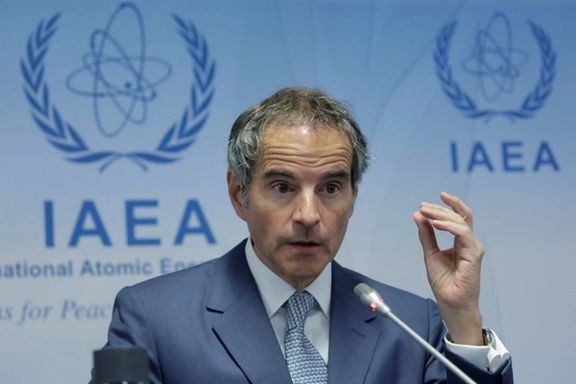
Iran and the IAEA announced an agreement in March on re-installing surveillance cameras introduced under a deal with major powers in 2015 but removed at Iran's behest last year. Only a fraction of the cameras and other monitoring devices the IAEA wanted to set up have been installed. But US officials have already acknowledged, according to Bloomberg that they have reduced enforcement of sanctions that has led to a doubling of Iran's oil exports since mid 2022.
Adding to the issues likely to cause tension with the West, Iran's stock of uranium enriched to up to 60 percent grew by an estimated 7.5 kg to 121.6 kg, the report said, even though 6.4 kg of it was diluted with uranium enriched to a lower level.
Iran's production of uranium enriched to up 60 percent has slowed to around 3 kg a month from about 9 kg a month previously, a senior diplomat said.
Other diplomats have said the slowdown could be part of so-called "de-escalation" efforts between Iran and the United States also involving Iranian funds frozen abroad and US prisoners held in Iran, though US Secretary of State Anthony Blinken has denied the issues are linked.
"Of course, Iran claims (the slowdown in enrichment to up to 60%) as a positive, but more HEU (highly enriched uranium) is still more HEU," one Western diplomat said.
CAMERAS WITHOUT FOOTAGE
Iran's stock of uranium enriched to 60 percent is now almost three times the roughly 42 kg that by the IAEA's definition is theoretically enough, if enriched further, to produce a nuclear bomb. Experts add, however, that some uranium would be lost in the process. Iran denies wanting to produce nuclear weapons.
The IAEA continues to have regular access to Iran's declared nuclear facilities and its core nuclear activities under long-standing agreements that predate the 2015 nuclear deal, but the 2015 deal added monitoring to areas such as the production of parts for centrifuges, machines that enrich uranium.
Even where IAEA monitoring equipment has been re-installed, such as at a site in Isfahan, it does not have access to the footage that its cameras record since that was not included in the March agreement it negotiated with Iran.
One of Monday's reports spelled out that problem.
"The Director General reiterates that for Agency cameras to be effective, including those installed at Esfahan, the Agency needs access to the data they record."
With reporting by Reuters, Bloomberg
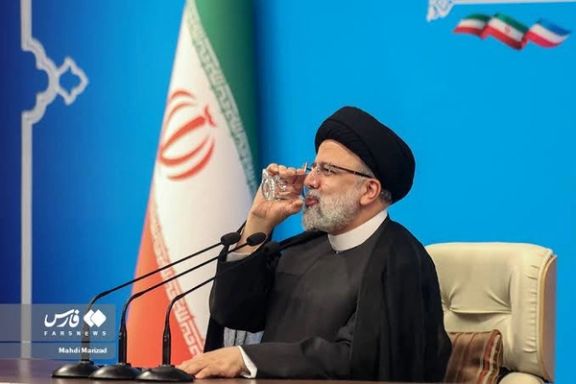
The Iranian government’s debt surged by 61% during the last budgetary cycle, amid a severe economic crisis, as reported by Parliament’s Research Center on Sunday.
The huge jump occurred during the first full year of Ebrahim Raisi’s presidency, dominated by hardliners, who insisted on continuing their anti-Western foreign policy and claiming that economic sanctions imposed on Iran can be defeated. The period spans from March 22, 2022, to March 21, 2023, or the Iranian calendar year 1401.
The annual borrowing total reached nearly $50 billion, representing 30 percent of the yearly GDP. This level of borrowing is unprecedented and indicates an increase in money printing by the government, which is likely to result in further inflation, since the borrowing was entirely from domestic state or quasi-governmental banks. In turn, these banks face huge debts and an unstable financial situation. Therefore, when the government borrows from these institutions, they have to turn to the Central Bank of Iran for liquidity and the central bank has to print more money.
To provide context, Turkey's total government debt is equivalent to 31 percent of its annual GDP, whereas in Iran's case, one year's borrowing alone has reached the same level.
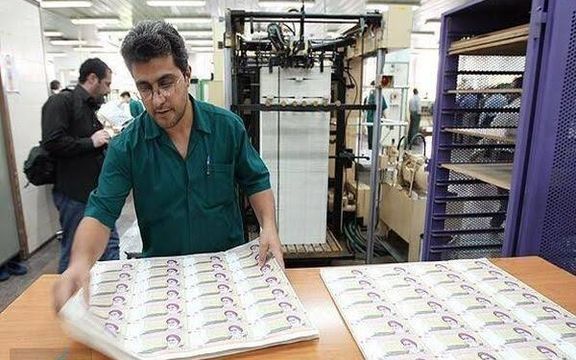
This development poses the question about Iran’s increased oil exports in 2022 and 2023, which should have provided financial resources to the government and forestalled more borrowing. During the period in question Iran sold around 1.2 million barrels of oil daily, mostly to China, and with high prices in 2022 it should have brought in at least $26 billion even if sold the oil at the discounted price of $60 per barrel.
Around $11 billion is provided at deeply discounted exchange rates to importers of food, medicine and animal feed. This means that around $5 billion is “wasted” on indirect subsidies. That still leaves around $20 billion for other government expenses, including 15 percent as share of the National Oil Company.
This is basically half of what the government needs from oil exports in order to balance its budget, and it explains why it was forced to borrow more, or to be precise, to print more money. But $20 billion in 2022 was probably more than the government had earned from oil exports in previous years since 2018, when the United States imposed sanctions on Iran’s oil exports.
One explanation about why the government fell into more borrowing in 2022-2023 could be that national reserves dwindled after repeated withdrawals since 2018. A report in August indicated that in the past decade Iran withdrew $140 billion from its National Development Fund, mostly since 2018, leaving an estimated small amount of $10 billion.
Oil exports are said to have increased in recent months reaching 1.5 million and in August surging to around 1.9 million barrels a day, as the United States relaxed its enforcement of sanctions to try to reach a nuclear deal with Tehran.
However, it is not clear how much discount Iran is offering Chinese importers to compete with discounted oil from Russia. In recent days, media in Tehran estimated that the government could be selling its oil for as little as $30 per barrel, given a statement by a top official that it was able to earn just half of what it expected from March to August of this year.
Annual inflation is already hovering at around 50 percent and the national currency has fallen by 50 percent in one year to 500,000 rials per one US dollar. The coming months will show if the higher borrowing will lead to even higher inflation.
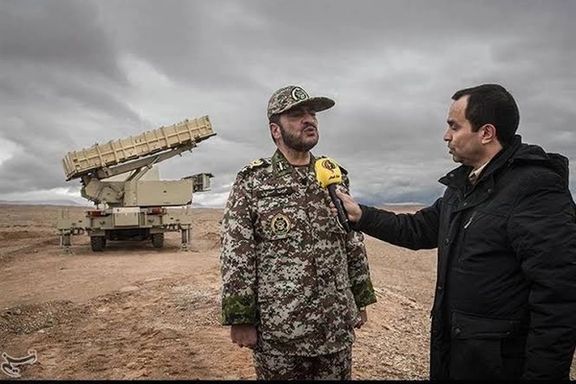
Iran’s Commander of the Army Air Defense Force has declared the readiness to engage in cooperative military activities with "friendly and allied" countries.
During a meeting of foreign military attaches stationed in Tehran, Brigadier General Alireza Sabahifard said that Iran is prepared to expand various forms of military cooperation, which include planning joint exercises and exchanging technical and operational expertise, as well as holding regular bilateral meetings.
As reported by the Fars News Agency, Sabahifard also emphasized the army’s need to exchange knowledge and experience with allies, as well as share new scientific developments and the strategic aims.
Prioritizing equipment reliability and operational performance enhancement, he disclosed ongoing efforts to carry out necessary maintenance and repairs, aligning with standard practices adopted by military forces around the world.
The announcement comes against the backdrop of heightened tensions in the region. In recent weeks, the United States has increased its military presence in response to Iran's actions aimed at disrupting maritime traffic in the Strait of Hormuz and the surrounding waters.
The Pentagon's response included the deployment of additional F-35 and F-16 fighter jets, along with a warship to the Middle East. These measures were taken to monitor crucial waterways in the region following Iran's seizure and harassment of commercial shipping vessels.
Incidents involving shipping in Persian Gulf waters have occurred since 2019 during times of escalated tensions between the United States and Iran. The Strait of Hormuz, through which approximately one-fifth of the world's crude oil and oil products pass, remains a strategically vital maritime choke point.
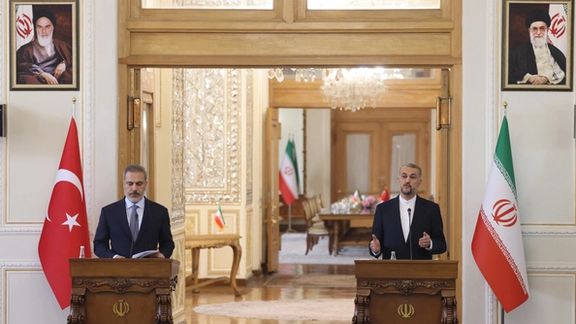
Iranian Foreign Minister Hossein Amir-Abdollahian met with his Turkish counterpart, Hakan Fidan, in Tehran to discuss the expansion of bilateral trade relations.
During the meeting, Amir-Abdollahian announced an ambitious goal of increasing trade between the two nations up to 30 billion euros.
The two foreign ministers reiterated their commitment to strengthening economic ties and agreed to sign a comprehensive agreement on trade cooperation.
Notably, during the presidency of Mahmoud Ahmadinejad, Iran and Turkey had previously agreed to increase bilateral trade to 30 billion dollars by 2016. However, recent official figures from Turkey reveal that the trade volume remains significantly lower, with total exports to Iran amounting to only 1.66 billion dollars in the first seven months of this year, and imports from Iran standing at 1.36 billion dollars.
Last year, the total bilateral trade between Iran and Turkey amounted to less than 6.4 billion dollars, underscoring the need for renewed efforts to achieve the ambitious trade target.
Meanwhile, Hakan Fidan, the Turkish Foreign Minister, emphasized the need for cooperation between Turkey and Syria in combating the Kurdish PKK group, recognized as a terrorist organization by Turkey, the European Union, and the United States. He called for increased collaboration between the Syrian government and Ankara on this issue.
Amir-Abdollahian echoed the importance of addressing Turkey and Syria's concerns related to terrorism, border security, and refugees through diplomatic dialogue, emphasizing respect for the sovereignty and territorial integrity of both countries.






